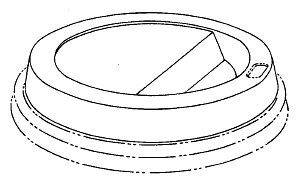Citable No. 43: TTAB Interlocutory Ruling on Protective Order and Expert Witness Issues
Interlocutory rulings of the TTAB are difficult to find and are rarely deemed citable. However, the Board's 43rd citable decision of the year is a citable interlocutory decision, involving protective order and expert witness issues. Georgia-Pacific Corp. v. Solo Cup Co., 80 USPQ2d 1950 (TTAB 2006).

Modification of the Standard Protective Order: Opposers Georgia-Pacific and Fort James sought modification of the Board's standard protective order to permit access by certain of their in-house counsel to information designated "trade secret/commercially sensitive" by Applicant Solo Cup. Under the terms of the protective order, only outside counsel may have access to that category of information.
Interlocutory Attorney Frances S. Wolfson followed the CAFC's analysis in U.S. Steel Corp. v. United States, 730 F.2d 1465 (Fed. Cir. 1984), which considers whether a particular in-house counsel is "involved in its employer-litigant's 'competitive decisionmaking.'" She wrote:
"In U.S. Steel Corp., the court defined 'competitive decisionmaking' as 'shorthand for a counsel's activities, association, and relationship with a client that are such as to involve counsel's advice and participation in any or all of the client's decisions (pricing, product design, etc.) made in light of similar or corresponding information about a competitor.'"
Here, the record provided "little insight" as to the role, if any, that Georgia-Pacific's in-house counsel play in competitive decisionmaking activities. Opposers provided assurances that trade secret/commercially sensitive information would be safeguarded and segregated from their business representatives. But the Board was "unable to conclude that opposers' in-house counsel are not involved in the competitive decisionmaking process at their employers." Accordingly, it denied the motion.
Access to Expert Witness Report and Discovery Testimony: Opposers sought an order re-designating as non-confidential the expert report and discovery deposition transcript of Applicant's expert, Dr. Singh. Those documents were designated confidential or highly confidential, and as a consequence Opposers' in-house technical experts were restricted from reviewing them.
Without describing the information contained in the documents, the Board decided that some portions were over-designated (e.g., portions dealing with his credentials, his involvement as an expert in other matters, and how he came to be a witness in this proceeding). However, other portions remained as designated.
The Board recognized that this ruling left Opposers with "a difficult choice: either retain an outside expert at this time, not knowing whether applicant intends to use any of the Singh report or take Dr. Singh's testimony to introduce the report during its case in chief, or wait until applicant's testimony period closes to see if testimony is taken from Dr. Singh in regard to his report. In the latter case, opposers will have little time to retain an outside expert to assist it with its rebuttal testimony."
Taking pity on Opposers, the Board ruled that if applicant decides to introduce any portion of Dr. Singh's report or to take his testimonial deposition, Opposers' in-house expert should have access to the report and the discovery deposition. Therefore, "to allow opposers a fair opportunity to prepare for cross-examination and rebuttal," the Board made the following order:
"applicant shall provide advance notice to opposer (no later than two weeks before the opening of applicant's testimony period) of any plans to take Dr. Singh's testimonial deposition to introduce the Singh report into evidence during applicant's testimony period. ** If ... such notice is provided, then upon notice, opposers' in-house technical experts may access the Singh report and Dr. Singh's discovery deposition transcript, to help prepare counsel for cross-examination of Dr. Singh."
The Board went on to order that, two weeks prior to the opening of Opposers' rebuttal testimony period, Opposers must disclose the identify of any expert they intend to call, and applicant shall have an opportunity to take discovery of that expert.
TTABlog comment: Under the proposed TTAB Rule changes, the Board's standard protective order would be imposed at the commencement of each proceeding. Disclosure of experts would be required midway through the discovery period. [Currently there is no provision for mandatory disclosure of expert witnesses]. The several IP organizations that recently met with the PTO regarding the proposed Rule changes (TTABlogged here) recommended that the Board adopt a more flexible approach, "perhaps even setting a period for expert disclosures and discovery -- after fact discovery has closed and before the plaintiff's testimony period opens."
Text Copyrigth John L. Welch 2006.




0 Comments:
Post a Comment
<< Home